
A Survey of Writers on Contemporary Writers
Listening to writers read and discuss their work at Newtonville Books, the bookstore my wife and I own outside Boston, I began to wonder which living, contemporary writers held the most influence over their work. This survey is not meant to be comprehensive, but is the result of my posing the question to as many writers as I could ask.
CHRIS ADRIAN
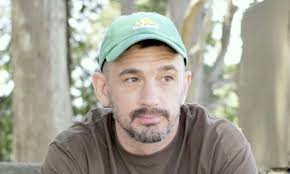
© Gus Eliot
NELLIE HERMANN: Why do we write?
It’s an age-old question, one with a million answers and the whole weight of human history behind it, one that each of us answers for ourselves, perhaps in our work, perhaps in the depths of our solitary nights. Libraries have shelves of tomes of aesthetic theory that attempt to answer it, and many anthologies and MFA program symposiums attempt it too. As with all of our most difficult questions, it is so complex to answer, so deeply unsayable, in many instances, that it is perhaps most often not asked and not answered at all.
In my day job, I teach creative writing to health care practitioners and other folks who may not practice it in their daily lives. I encourage those who are not used to exercising their imagination to try out their muscles, to embark on the creative process and see where it takes them—to use the imagination as a tool towards understanding, to exhibit and unleash its powers for processing questions and unimaginable things. I have learned that the average person feels uncomfortable with the notion of being “creative,” thinking that it is something foreign, when in fact they are creative in a million ways every day. How does a physician or a nurse wrestle with the awful truths of body and soul that they confront daily? However s/he does it, there is creativity in that wrestling, I guarantee. I tell them: this is why we write. Caregivers and patients alike, this wrestling is what it is for.
Chris Adrian makes plain the wrestling—his work says all that I’ve ever struggled to say in the classroom, and without directly addressing any of it at all. His work says: of course we wrestle, for wrestling is the moral, and the mortal, thing to do. If we stop wrestling with the world we are dead. His work does what all good writing should do, which is to answer the questions we didn’t know we were asking, and to answer them in such a way that the work is the answer, beyond the need for any other words. A boy is troubled by the death of his brother, and so by the death of everyone, and grows up to build a machine that he hopes will abolish death once and for all and bring his brother back to life; a children’s hospital floats on the world decimated by a second flood, and the population of the hospital (guided by a second population of angels and ghosts) struggles to survive and take care of each other; a re-telling of Midsummer Night’s Dream becomes a story of fairies that are wracked by grief, couples that struggle to find their way back to each other, and Love as it crosses over death and the realms of the magical and the real. And these are only the novels.
I don’t write like Adrian—I have never (yet) had a fairy in a story of mine, never (yet) employed magic or the supernatural. There is a wonder to his work, an enacting of a world beyond us that we can’t see, a putting-to-work of mystical forces that I have not (yet) been able to harness. Yet his writing makes plain to me something about my own work and about the work of all writers that I love: at root, our answers to the age-old question of why we do it is the same. We employ what we can, we imagine what we must. Since we can’t find the answers, we make a story that dramatizes the struggle, we make a story that shows that the answers can’t be found, and that in our searching is where we come the closest to them.
Chris Adrian answers the question of why we write in each piece of his writing; answers it so thrillingly and with so much depth and complexity that you feel silly for even asking it in the first place. In his work, the question is thrown up in the air and then exploded into a trillion shining bits of magical light that then fall down on your head and blind you. Why do I write? It is because life is not easy, because life is complicated and often cruel and full of heartbreak and death and sorrow and also glory and mysterious and sustaining love, and because I know no other way than to wrestle with what compels me beyond my understanding through tiny created worlds made out of words. Chris Adrian teaches me, reminds me, and provokes me to remember this, to know why I write.
SHERMAN ALEXIE
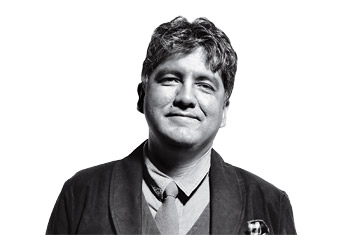
© Lee Towndrow
ANNE MARIE WIRTH CAUCHON: Unlike the rest of us idiots, brilliant people are hilarious. Sherman Alexie is not an idiot. But humor isn’t the whole of what makes his work brilliant. Take, for example, the beginning of The Lone Ranger and Tonto Fistfight in Heaven, where Sherman Alexie plaits storm fronts and landscapes with socialized human bodies, psyches, souls. From this twill his spare dialogue emerges, dialogue that expresses volumes more than it speaks explicitly. “Rain and lighting. Unemployment and poverty. Commodity food. Flash floods. ’Soup,’ Victor’s father would always say. ‘I want a bowl of soup.’ Mother’s Kitchen was always warm in those dreams.” Here, Sherman Alexie presents the essential elements of Indian and non-Indian alike: rain, light, poverty, food in capitalism, again rain, and soup. Or rather, words written and/or spoken about soup in a dream, words that prove soup to be more than itself.
In much of Sherman Alexie’s work, landscapes seep into human bodies and minds as history mingles with the present, where dreams and reality mingle too. Sherman Alexie presents time that is not literal or linear, but is cumulative and omnipresent, a gathering-together that proves greater than any particular moment, event, or life. With this temporal model Sherman Alexie does not flinch in the face of atrocities enacted against tribal members by the United States Government and its citizens, but presents a historical and contemporary narrative of multifaceted universality based on humanity’s ongoing prismatic story and stories; the story and stories we forever tell and retell ourselves about ourselves so that despite everything we’ll have reason to carry on, together and alone. In this increasingly homogenizing and synchronous warming global culture, models for collective and autonomous time, thought, action, and aesthetics like those presented by Sherman Alexie appear increasingly essential.
AMY GRACE LOYD: By way of Twitter Sherman Alexie sent out this message recently: “There are approx 2 mil In’dins so there are approx. 2 million ways of being In’din. Don’t let those In’din fundamentalists tell you otherwise.” The day before, on the Fourth of July, he wrote, “All In’dins are selling fireworks today in celebration of white people’s independence.” A poet first, a poet always, Alexie isn’t limited by 140 characters; he’s emboldened by the space or lack of it and makes it his—as music, subversion, a poke and a joke, a punch in the gut or nose, depending.
He’s been called the Native American James Baldwin and the comparison fits, but more than Baldwin or any writer I’ve read, Alexie is a trickster, a compulsive shape shifter. He’s a Spokane Indian who admits how angry he is—at whites and often enough at Native Americans. He’s a heretic and a comedian; a man who wants to belong but who also wants to be free of the compromise and sometimes complacency that can entail. In an interview with PBS’s Bill Moyers on the occasion of the publication of his new and selected stories Blasphemy, Alexie claimed he lives in between cultures, as insider and outsider: “The end game of tribalism is flying planes into buildings. So since then I have tried, and I fail often, to live in the in-between.” He then described how vital it is to him to hold any number of conflicting ideas in his head at once. He referenced Keats and that poet’s term for just this expansiveness of mind, “negative capability,” and then Alexie admitted again, “But I fail often.”
As fluent as Alexie is at confrontation, as definitive and unsparing in denouncing injustice, simple foolishness, he’s tender, too, regretful, frequently within the same work or interview or public address, explaining that “it’s not oil that runs the world, it’s shame.” Yours, mine, his. The line comes from his remarkable short story “War Dances,” from the collection of the same name, about a man who, like Alexie, is Native American but can pass for white (or in the range of white) and who, with a single swing of his son’s aluminum baseball bat, kills a black teenager who has broken into his home. “It was self-defense, but it was still murder. I confess: I am a killer.” Written years before George Zimmerman and Trayvon Martin had their tragic encounter in Florida, before the much televised trial, it touches on how the court of public opinion feeds on itself, and in its frenzy to get the story (or some version of it) fudges the facts, misses the point, and then moves on blithely to the next story, the next carnival, as if nothing was lost at all, as if no one was culpable or, worse, culpability has become irrelevant.
In his poem “Vilify,” an irreverent consideration of Mount Rushmore, the speaker of the poem, Alexie (yes, invariably Alexie, bold again, denuded and glad to be), tells us, “I’d much rather commemorate the other presidents. Let’s honor JFK’s whoring and drinking/ Or the duels Andrew Jackson fought to defend his wife’s honor. Why/ don’t we sculpt that?” And later in the poem, “Because I know every president, no matter how great on the surface, owned a/ heart chewed by rats.” He knows because he knows his own heart and his own imperfections and readily cops to them in his work and elsewhere—his alcoholism, his bi-polar disorder, his weakness, his longing, a desire so intense and unwieldy he can barely contain it—and yet he’s uncowed, unbowed. He’ll make fun of social media as only he can and then make brilliant use of it. He’ll assert that his first story collection The Lone Ranger and Tonto Fistfight in Heaven was not autobiographical and then, later, upon re-reading the stories, he owns, “Wow, this is memoir” and laugh at himself, marvel, and keep Tweeting—with teeth, humor. He’ll keep writing with his characteristic electricity and immediacy—the latter of a poet—but also of a man in between, who can speak all the languages of the cultures he’s ostensibly part of, with terrifying ease, even in short hand, with irony (“In’din”), and make you laugh while he’s measuring the distance between us all, playing with that distance, collapsing it. No matter the dominant tone of a poem or story or longer work, there’s that live, unpredictable voice, his singular achievement, that voice, seducing, chiding; and whatever the emotion expressed, the energy of his work opens out, expanding, to pull us all in; complicit, yes, we are. We are joined by our fallibility and somehow in Alexie’s hands the knowledge is both terrifying and freeing. Yes, how freeing it is to laugh at oneself, laugh out loud.
I should admit here that I’m an editor by trade. I’m also a fiction writer, though I’m usually shy about admitting this. When I was, for seven years, Playboy’s fiction and literary editor, I worked with Alexie a few times. Working with an author, particularly an established one, is not a guarantee of liking them or their work, not at all, and working at Playboy was rarely straightforward either, given the jokes and judgments and confusions about the magazine and its legacy or legacies. I took my job seriously—to make literary work as lively and relevant an element in the magazine as any other. A tall order and it required patience, stubbornness, and often subversion. We did a series of essays about crushes, titled “Truly, Madly, Deeply.” Sherman contributed a piece about his crush on Indigo Girl singer/songwriter Amy Ray. The piece begins, “I fall in love with lesbians. Not porn lesbians. Everyday lesbians. The ones who don’t want men to fall in love with them. Oh, they don’t mind the attention, even the flirtation, but the physical boundaries are firmly in place. But wait, I fall for the other kind, too. The lesbians who want men to fall in love with them so they can ground and pound the vain masculine heart.” He’s at it again: confiding cheerfully, acquainting the reader with the impossibility of his longing, the hilarity of it, and one is taken in, wants to keep pace with him and his gorgeous fluency, no matter he’s playing outside of some readers’ experiences, rules, even outside that magazine’s longstanding and some would say calcified love affair with a narrowly defined American heterosexual male. In doing his job so well with that essay, Alexie helped me do mine—converting readers to the cause of reading by showing them that words on a page can be as alive and surprising as any competing visual media.
On that occasion and so often when I read Alexie’s writing, he has brought to mind a line from Psalm 94:1: “Oh God of vengeance, show thyself.” There are many translations of the line, particularly the second half. These are “display your splendor” or “be revealed” or “shine forth.” As a woman editor at Playboy, fighting for the magazine’s smarter self, for the congress of voices and perspectives available to it, and now as a writer—one in progress—Alexie’s work has come to feel like a call to action: to find your proper voice and tell your story, maybe out loud, maybe in broad daylight, with commitment, even vengeance, regardless of whether those around you agree with you or have ears or eyes for what you’re offering. Alexie counsels going big (in his case, dizzyingly so), even as you feel small. Certainly writing and publishing literary fiction in what feels like an increasingly unliterary age requires putting shyness aside. It requires trying and failing, sometimes publically. “I fail often,” Alexie says.
In their conversation Bill Moyers asked Alexie what he means by blasphemy, the title of his 2013 collection. The author replied, “I don’t believe in your God. And ‘your’ means the royal ‘your.’”
Moyers asked, “Do you believe in your God?”
“No.”
“What do you believe in?”
“Stories. Stories are my God.”
Well, all right, then Amen. Amen to that.
MARTIN AMIS
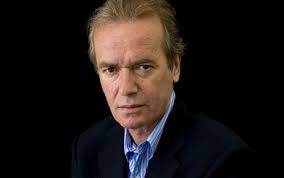
© Getty
VICTOR LAVALLE: By chance, I recently started rereading The Information by Martin Amis. (It was sitting in the little lending library in our building’s laundry room; I picked it up just to pass the time while my son was busy running around the basement playing and clothes were being soaked and rinsed.) I began reading and remembered first picking this book up in 1995 or 1996, right around when it came out. I don’t know quite why I bought it then, I don’t remember being terribly caught up in the hype about the novel. (Amis got an advance that could only be counted in gobs and, much worse to the Brits, had his terrfically bad teeth fixed as part of the advance; that’s the story anyway.) Whatever the reason, I read the book then and it just staggered me.
The Information is about Richard Tull, an aspiring, and generally untalented, writer living in middle-class London. He’s published a few books to nearly no acclaim. His best friend, Gwyn Barry, had been doing even worse until, one day, Gwyn publishes a novel that becomes a worldwide sensation. He’s suddenly wealthy, famous, and married to a distant cousin of the Queen. Richard loses his mind and decides to destroy Gwyn’s life in various ways. Hell hath no fury like a writer passed over! As you can guess from the summary the book is manic and hilarious. But it’s also so beautifully written that it almost makes me lose my breath, even on my second reading now. Let me quote one little passage, choosing this one simply because I’m on this page in the book:
“It would seem that the universe is thirty billion light years across and every inch of it would kill us if we went there. This is the position of the universe with regards to human life.“
This has nothing to do with the plot of the book, but it touches on the larger ideas (how important, or unimportant, we are in the larger scheme of things; general middle-age-crisis hand-wringing but done with black humor.) This novel spurred me into reading much more of Amis: Money, Success, Visiting Mrs. Nabokov. I was a glutton for his prose. I indulged in Amis. And I think his work meant so much because I was trying to learn to mimic, his fluidity, his bleak humor, his endlessly inventive similes.
It’s strange, now, to realize how much Amis has meant to me. Strange because I feel as if I’m transitioning away from some of what made him so important to me at first. His willingness to sacrifice narrative at the altar of pithiness seems especially problematic now. But for a very long time the man could do no wrong in my eyes. And, despite that criticism, rereading The Information now really is like finding a wine I’d forgotten I loved so dearly. The temptation is to stay drunk on it for a long while. Say, a century.
NATHANIEL RICH: I discovered Martin Amis thanks to Stone Gossard. I had read an interview with Pearl Jam’s guitarist in Rolling Stone, GuitarWorld, or Guitar. I know it was one of those three because they were the only magazines to which I subscribed during high school. (You may recall my popular band of that period, the Blanket Vibe; our hit album was called Over the River and Through James Woods.) In the interview Gossard spoke highly of Money; he mentioned reading it on an airplane and laughing out loud. That’s all I needed. I took Money with me on a canoe trip in Maine that summer. I dropped the paperback in the St. Croix River and had to leave it to dry on a rock. I remember being worried that the pages would tear, but the sun was hot and crisis was averted.
Reading the novel I was seized immediately by the cynicism, nastiness, elegant crudity, and, most of all, those sentences. I’d never encountered anything like them before:
“Recently my life feels like a bloodcurdling joke. Recently my life has taken on form. Something is waiting. I am waiting. Soon, it will stop waiting—any day now. Awful things can happen any time. This is the awful thing.”
I decided to devote my life to reading Amis with the same level of obsession that, in the previous five years, I had applied to Stephen King.
DONALD ANTRIM
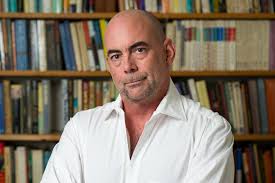
© John D. & Catherine T. MacArthur Foundation
JAMES FUERST: The three novels that comprise Donald Antrim’s trilogy—Elect Mr. Robinson for a Better World (1993), The Hundred Brothers (1997), and The Verificationist (2000)—are all odd, powerfully imagined works that are as funny and disturbing as they are riveting and original. Despite their many differences, all three are narrated in first person by a middle-aged male who guides us around his sliver of suburbia and lures us into his confidence, a confidence we only slowly come to grasp as that of a social misfit, an instigator, a lout. Meanwhile, our guide has already eased us through a series of relatively minor violations of moral, physical, and intellectual norms; a turn is then made, something inexplicable occurs, and the initial weirdness of the narrative grows ever weirder. The absurdist and hallucinatory escapades that follow are impossible on a number of levels and in a variety of ways. But Antrim’s impossible narratives unfold so seamlessly from the engaging voice, perspective, and experiences of his narrators that we find ourselves too mesmerized to balk at their transgressions of the “real” and too captivated to turn away. Instead, we are giddily swept along in the mounting delirium and ultimately find ourselves treated to warped and unforgettable renderings of the emotional lives and ordeals of unstable men illuminated brilliantly from within.
Acclaimed authors such as Jonathan Franzen, Jeffrey Eugenides, and George Saunders have all lauded Antrim as a true American original—at once unique, delightfully peculiar, and lacking in precedent—praising his linguistic prowess and exquisite sentences, his unfettered imagination and devilish humor. In September 2013, The MacArthur Foundation awarded him a “Genius” Grant, an honor he richly deserves. His reputation and status in the contemporary canon are secure for the foreseeable future. But the greater part of the influence his works will have on younger and coming generations of American writers will most certainly stem from the fact that they are irreducibly his own, from the extent to which Antrim stands as our time’s most accomplished and inspiring exemplar, in the words of René Char, to cultivate one’s own legitimate strangeness.
I was fortunate to take a literature seminar with Donald as an MFA student. The topic was “fantastic fiction,” and the readings he assigned were an eclectic mélange that included George MacDonald’s Phantastes, Angela Carter’s The Infernal Desire Machines of Dr. Hoffman, Ben Marcus’s The Age of Wire and String, Rachel Ingalls’s Mrs. Caliban, and Henry Green’s Party Going, among others. As a teacher, Donald was approachable and easy to talk to, generous with his time and talents, very knowledgeable about the subject material, and both thoughtful and responsive to students in and out of class. We learned about the fantastic as suspension of disbelief, then as suspense, then as sustaining a reader through sudden reversals, and so on. As an unanticipated bonus for fiction concentrators, Donald allowed us to submit a short creative piece in lieu of a longer essay at the end of the semester, the best of which, selected by him, we would discuss in class.
It seemed that the stars had aligned so I could make an impression on a writer I admired: I’d read The Verificationist in preparation for the course and was excited to learn from someone whose own aesthetic was so intensely smart and wildly imaginative. I submitted a highly polished story that I’d been working on for a while and of which I was proud. The story was—as was its author at the time—let’s say, bookish: I loved the multitudinous ways that books spoke with and to other books and tended to gravitate toward that subject when I wrote. Since each of Donald’s highly intelligent narrator-protagonists deploys some version of what Tom from The Verificationist calls a “psychoanalytic vernacular,” there was reason to think he would be especially receptive to my concerns.
The class finally arrived, and once we got under way, Donald first selected a fellow student’s story for us to discuss, then he selected another, and then another, and another, and so on, until suddenly everyone was packing up, and it was time to leave. Confused by the omission, I approached Donald afterward and asked if he’d read my story. He said yes. I asked if he liked it. To his great credit, he answered without hesitation or evasiveness. No, he said, I didn’t like it. When I asked why, he said that my narrator was too distant, too disconnected, too far away; I needed to get closer, much closer to what I was writing about.
It was the kind of criticism that cut deeply for a couple of reasons. First, no one had ever told me that before. Second, as soon as Donald said it, I knew that it was undeniably and indisputably right: not only was the narrator of that particular story too far removed, but I realized almost instantly that all of my narrators were too distant, too disconnected, too far away, as well. If I wanted my fiction to improve, I needed to get closer, much closer to what I was writing about, I had to find more effective ways to work from the inside of a story to the outside, rather than the outside in.
In many important respects, I have been trying to do just that in my own work ever since.
ERIC LUNDGREN: I’m tempted to call the trio of short novels Donald Antrim produced between 1993 and 2000 a Divine Comedy for our time. Certainly, finding these books in the course of getting my MFA, when I was reading so much fiction in photocopy that also seemed like a photocopy of … something—these books were otherwise. Being young and foolish, I read them backwards, starting with The Verificationist, retreating to The Hundred Brothers, and finishing with Antrim’s debut, Elect Mr. Robinson for a Better World. Returning to Antrim a decade later, I can see how these slim novels form a sequence, from the drawing and quartering of an ex-mayor (by Subarus) in Robinson, to the Brothers’ claustrophobic male hell (there’s even a brother named Virgil) and ending with The Verificationist’s vision of transcendence: a hallucinatory visit to a Revolutionary War battleground with a teenage Pancake House waitress.
Antrim speaks to the chronic outsider in us. These are queasy comedies of cramped quarters (The Hundred Brothers in a crumbling estate library, The Verificationist confined to one all-night pancake restaurant). Yet the books themselves seem expansive, generous, even ecstatic. They are narrated by nervous men who are beset by doubt and death, who are in trouble with women, who are precise delineators of their discomforts and anxieties. They could be title-card writers for Buster Keaton or Harold Lloyd. The comedy is the comedy of trying and failing to comfortably exist in the world. Of inhabiting a failing body that will die—ha ha.
Yet how richly he delights. Antrim seems to come out of nowhere: the underwater coelacanth-on-bison love scene in Robinson will never be attempted again. I believe naming Antrim as an influence would make him uncomfortable. His work is full of juvenile rebellion and uneasy paternity. I think of Doug in The Hundred Brothers, unzipping in his family’s library to “hose down, as they say, a few literary masterpieces.” I think of Bernhardt, the father figure in The Verificationist, lifting his protégé Tom in an ecstatic, transcendent embrace—never mind the fact that Bernhardt’s boner presses painfully into Tom’s back for almost the entire novel. No, I’m not going to get into the fraught issues of Antrim’s influence on a younger generation. Let me simply quote another young writer’s response to Antrim’s recent MacArthur grant: “I was so happy. I wouldn’t have been much happier if I’d gotten the grant myself.” That goes for many of us who speak of his books in hushed tones, with evangelical fervor and cultish protectiveness, with awe and ardency.
PAUL AUSTER
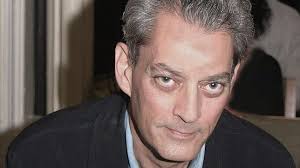
© Corina Arranz
KEVIN P. KEATING: In 1992, when I was studying film as an undergraduate at Columbia College, Chicago with dreams of becoming the next Stanley Kubrick, I took a class in Contemporary American Literature, and for the first time in my life I was introduced to books by ambitious authors who, like Kubrick, attempted to make the avant-garde popular, or at least more palatable to mainstream audiences. While 2001: A Space Odyssey and The Shining may have been marketed as science fiction and horror movies respectively, these epic films, even to the casual viewer, clearly had much more to say about the human condition than the mass-produced genre pieces of the same era.
One of the first serious writers to capture my imagination in this regard was Paul Auster, whose 1989 novel Moon Palace combined the tropes of the old-fashioned adventure story, placing a special emphasis on the quest motif, with lengthy discussions of books and artwork, luck and money, madness and freedom. Through the magic of his art, Auster somehow managed to successfully combine elements of mystery and metaphysics with an almost vertiginous intertextuality (before I knew what intertextuality even was), all in the context of an appealing, yet deceptively complex, narrative style.
The novel concerns the Dickensian adventures of Marco Fogg, an orphaned boy sent to live with an eccentric uncle who surrounds him great books and classical music, all of which serve as catalysts for his transformation into a young man. When he turns eighteen Marco reluctantly says farewell to his uncle to attend Columbia University in New York City and there comes under the wing of the morally ambiguous Thomas Effing, a “blind, elderly gentleman” who may or may not be totally insane and who, in effect, takes on the role of Marco’s mentor and shaman.
While much of the story is set in a modern American metropolis, it could just as easily have taken place millennia ago in some barren, desert wasteland with a cast of Paleolithic cave dwellers. That is to say, the whole story, as I read it, sounded timeless to me, and indeed much of the action occurs in the isolation of a cave in a remote corner of Utah where a man named Julian Barber spends his days painting hallucinatory images on the cave walls and, in the process, slowly and inexorably loses his marbles.
But unlike the anonymous chroniclers of ancient Israel who, trekking across vast wilderness landscapes, felt compelled to credit a supernatural force for imbuing human existence with meaning and purpose, Paul Auster tends to see life, good and bad, as little more than a sublime cosmic comedy “guided,” as it were, by blind chance. In his 2002 novel The Invention of Solitude, Auster writes, “Just because you wander in the desert, it does not mean there is a promised land” and perhaps more to the point, “There is no room in the world for a man who does not have a sense of his own ridiculousness.”
These ideas have influenced my own work in profound ways, especially my novel The Natural Order of Things (Vintage Contemporaries 2013), which concerns the adventures and exploits of skeptics and free thinkers, young and old, students and priests, at a Jesuit prep school in a dying industrial city who dare to question the concept of a supernatural order and who ultimately pay a heavy price for their perceived “heretical” beliefs.
Blind luck, random chance, a roll of the dice, life as a big gamble, existence as a dangerous and therefore thrilling game: all of these ideas can be attributed to my early exposure to Paul Auster, an author whose contribution to American fiction has, for me at any rate, been invaluable.
–
Nellie Hermann, author of The Season of Migration and The Cure for Grief
Anne Marie Wirth Cauchon, author of Nothing: A Novel
Amy Grace Loyd, author of The Affairs of Others
Victor LaValle, author of The Devil in Silver, Big Machine, The Ecstatic, and Slapboxing with Jesus
Nathaniel Rich, author of Odds Against Tomorrow, and The Mayor’s Tongue
James Fuerst, author of Huge: A Novel
Eric Lundgren, author of The Facades
Kevin P. Keating, author of The Captive Condition and The Natural Order of Things
–




